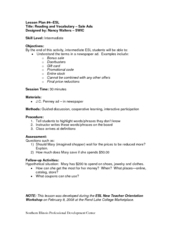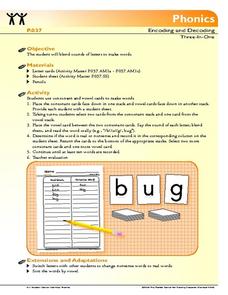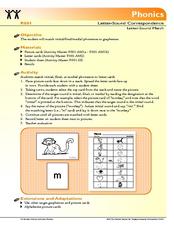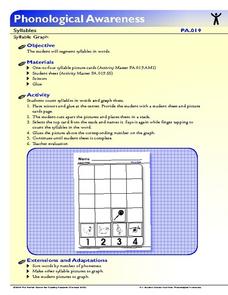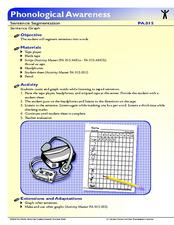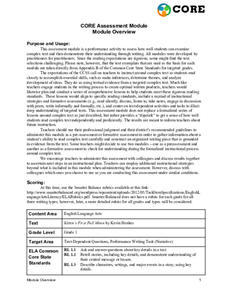Curated OER
Vocabulary Instruction: Identify and Sort Common Words into Categories
Kids learn about the concept of nouns. They practice identifying nouns by sorting words into categories. As the teacher holds up each word, the class reads it in unison, then they take turns identifying it as a noun or non noun word....
Curated OER
Reading and Vocabulary - Sale Ads
Intermediate ESL pupils practice reading sale ads. They will look through a sales catalog or newspaper and highlight words they don't know, work together to determine the definitions, then decide how much they save in given situations.
Teach-nology
Author’s Purpose
What is the author's purpose when writing a narrative story? Kids read a short narrative passage before answering three questions about author's purpose.
Florida Center for Reading Research
Phonics: Encoding and Decoding, Three-In-One
Scholars use the provided pack of alphabet cards to construct basic CVC words, then write down each word they make in one of two columns. Column one is for real words and column two is for nonsense words.
Florida Center for Reading Research
Phonics: Encoding and Decoding, Make-A-Word
Little learners place a picture card on a magnetic board, say the name of the object on the card, then sift through alphabet magnets to find and spell the word they said.
Florida Center for Reading Research
Phonics: Letter Recognition, Hungry Letter Mouse
Scholars take turns writing and identifying letters on a whiteboard. Learner one writes a letter; learner two finds it on the alphabet strip. If they are correct, Mr. Mouse gets to eat that letter, and if they are incorrect, Mr. Mouse...
Florida Center for Reading Research
Phonological Awareness: Phoneme Matching, Pack-a-Backpack
Scholars sort words based on their initial phoneme or sound. Learners are given two backpacks, each with a picture card; they search and match picture cards with the same initial sound as the ones on each backpack.
Florida Center for Reading Research
Phonological Awareness: Phoneme Matching, Medial Match
Early readers get together and match medial phonemes. They take turns picking picture cards from a pile; they say each word, then determine whether the pair has matching medial sounds.
Florida Center for Reading Research
Fluency: Letter Recognition, Speedy Alphabet Arc
On your mark, get set, match! Learners use a complete set of letters, matching each to its outlined letter on an arc. As they choose letters, they name them aloud. For added difficulty, another arc is missing most of its letters to...
Florida Center for Reading Research
Sound it-Bag it
Scholars sort picture cards based on the initial phoneme they hear as they say the name of each image. They pick a card, say its name, then place it in one of five bags based on how its initial phoneme matches the initial phoneme...
Florida Center for Reading Research
Drop and Say
This neat idea gets kids to use phonics and puzzle-solving skills. Pairs take turns picking picture cards from a pile, say the name of the object on the card, drop a letter to turn that word into a new word, then look for the new word on...
Florida Center for Reading Research
Phonics: Letter-Sound Correspondence, Letter Sound Match
Scholars match initial, medial, and final phonemes to individual graphemes. They pick a card, say its name, then find the letter that makes that sound. If the card is a monkey, the learner finds the letter m, matching the grapheme to the...
Florida Center for Reading Research
Phonics: Encoding and Decoding, A Digraph A Word
Learners view a series of images, then choose digraphs, consonants, and vowels to spell out the object's name on each card.
Florida Center for Reading Research
Vocabulary: Word Meaning, Oh My Word!
Ever come across an unfamiliar word while reading and can't decipher its meaning? Use a worksheet and graphic organizer that tracks and helps bring meaning to unknown words as learners read a text. A worksheet and graphic organizer come...
Florida Center for Reading Research
Phonological Awareness: Syllables, Syllable Graph
Scholars make a pictograph based on the number of syllables in each picture card. They choose a card, say the name of the object on the card, break the word into syllables, count the syllables, then glue the picture onto the number chart...
Texas Center for Learning Disabilities
Second and Third Grade Explicit Phonics Intervention
Support all young learners on their journey to literacy with this five-lesson reading intervention unit. Following a clearly outlined format, each lesson first engages children in practicing their phonemic awareness and phonics...
Florida Center for Reading Research
Phonological Awareness: Sentence Segmentation, Sentence Graph
Young scholars segment sentences while they listen to a series of sentences. Using a graph, pupils make a mark for each word they hear. Learners listen to each sentence three times; once to listen, once to mark, and once to check their...
Florida Center for Reading Research
Vocabulary: Morphemic Elements, Rooting for Meaning!
Scholars work with root and meaning cards to build vocabulary skills. Playing with a partner, learners read a root, locate its meaning, and cover it with a counter. The first player to cover their board wins.
California Education Partners
Kitten's First Full Moon by Kevin Henkes
A 3-day exam assesses readers' comprehension. After hearing a passage from the story Kittens First Full Moon by Kevin Henkes, scholars work with a partner to discuss and sketch what they found memorable. Peers share their final products...
Florida Center for Reading Research
Phonological Awareness: Phoneme Isolating, See It-Sound It
Working pairs, early readers put their hands into a mystery box, pull out an item, then name and identify its initial phoneme.
Novelinks
The Martian Chronicles: Fishbowl Discussion
Ray Bradbury's The Martian Chronicles provides the text for a fishbowl activity. Class members to sit in concentric circles, with the center circle discussing the topics from the book, and the outer circle observing the...
Western Illinois University
Activities for Supporting Oral Language Development
Support young scholars' oral language development with the use of four early childhood activities. To reinforce proficiency, pupils read with an adult, play a game of telephone with their peers, put on a play with puppets or stuffed...
Reading Resource
Going to the Movies (Basic Code Sentences)
Take a pretend trip to the movies with a series of basic code sentences. Images of movie tickets, popcorn buckets, and movie cameras award learners varying amounts of points for each sentence that they can successfully read.
EngageNY
Displaying a Data Distribution
Pupils analyze a display of data and review dot plots to make general observations about the highest, lowest, common, and the center of the data. To finish, learners match dot plots to scenarios.
Other popular searches
- Reading Centers
- Context Clue Reading Centers
- Reading Literacy Centers
- Hands on Centers Reading
- Guided Reading Centers
- Constitution Reading Centers
- Reading Comprehesion Centers
- 2nd Grade Reading Centers
- Kindergarten Reading Centers
- Mangement of Reading Centers
- Reading Comprehension Centers
- Constituiton Reading Centers



